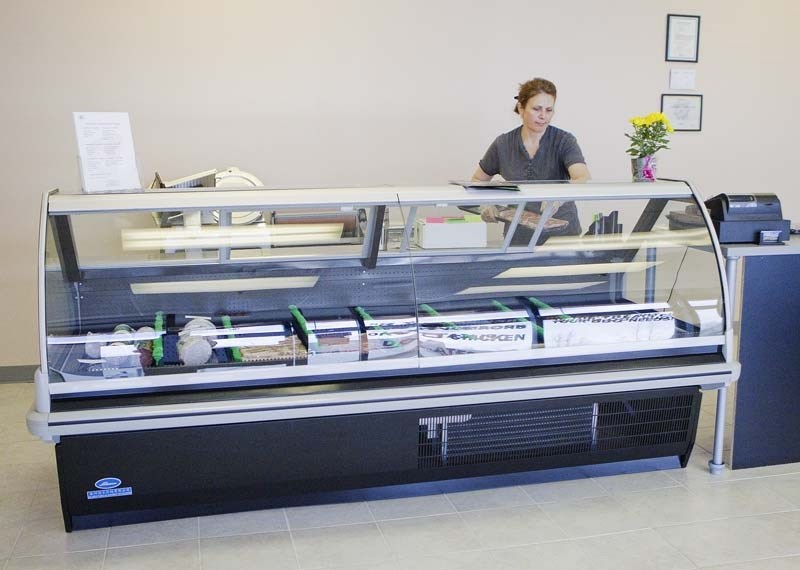Once on the endangered species list, the neighbourhood butcher shop is enjoying a resurgence in St. Albert.
The owners of these shops, which no longer embody stereotypical images of blood-stained aprons and backroom slaughterhouses, pride themselves in product diversity, customer service and sustainability.
Some are franchised businesses, such as M&M Meat Shops. But others are smaller, private stores, such as the one that Inga Malitski recently opened.
Prairie Meats & Deli butcher shop is tucked between a hair salon and a music store in an Akinsdale strip mall. Malitski chose the location with care, wanting to stay away from busy roads and allow her customers a more personable experience.
"I like my customers and I know them and they know me and for me that's better," she said, speaking of her experience of owning a store in her homeland of Ukraine.
Malitski supplies everything from steak to chicken breasts, venison, stew and homemade sausages. She buys her meat personally, from local free-range farms where animals are grass-fed and free of antibiotics.
Instead of putting it all on display, she keeps the meat in a cooler until a customer order requires her to cut off fresh pieces of steak or grab a few pounds of ground beef. Once she settles into the neighbourhood, she will grow her inventory and offer more variety, she said.
Malitski said she learned to prepare meat at home after the fall of the Soviet Union. Back then butchery provided a secure income.
Today, the business has become her pride and joy, and she's happy to help customers with everything from telling them how to cook the meat to taking special orders.
Shops like Malitski's are a welcome change from the rows of plastic-wrapped trays found at local supermarkets, said Dan Westgeest, program chair at NAIT's professional meat cutting and merchandising program.
In recent years, he's seen a growth in the industry which he largely attributes to consumers' interest in the quality of the product.
"People want more face-to-face interaction. They want to see where their meat is coming from. They want to get to know their local butchers and local source," he said.
The term butcher shop no longer applies to most of these smaller locations, Westgeest said, since most don't harvest their own animals anymore. They purchase the carcass from smaller meat packers that don't supply the large grocery stores, and prepare the meat in store.
St. Albert resident Debbie McLeod has supported local butcher Kyle Iseke for years. She shops at his store, D'Arcy's Meat Market, because of the service but also to support local business.
"I know them by name and they know my kids. I like the service. That's what it boils down to, service and the product," she said.
"My husband likes gigantic steaks and they know that. As long as they see him they know exactly how he likes it cut because it's the same people all the time."
A greater variety of product and better quality is also Monica Kohlenberg's reason to shop at a local butcher.
"I get all my meat here. I think the quality is better, I am not a pro, but we eat a lot of bison and I can get that here and I like to support the small businesses," she said.
Having found his niche in the market, Iseke says he provides for those whose appetite strays beyond the common steak.
In his Campbell Business Park store, the culinary adventurer finds everything from fresh bison, to boar stew, horsemeat and German pork cutlets (Kassler).
If the customer thinks the meat he wants is not available, Iseke finds it. If it has to be marinated or cooked a certain way, he prepares it. He also goes a long way to make sure his product impresses in taste.
"It's a lot about high quality ingredients and that little bit of skill to make it," he said.
"We make the veal and the pork cutlets the way people make them at home."
In the four years since he opened his store, Iseke said customer numbers have steadily increased. But it was the E. coli scare and other meat scandals that really moved people out of the big box stores and into his shop, he said.
On Saturdays, the customer lineup goes from his counter to the door. More than 200 people walk in and out of the shop in a day. Eighty-five per cent of them are return customers, he said.
"I work a lot of overtime, late nights and then the next day it sells in two hours and you have to scramble to make it," he said.
Creative outlet
Being successful in a small, private butcher shop requires creativity though. To make the most of their trade, butchers have to keep an open mind about new recipes and cuts, pleasing an increasing appetite for different tastes and traditional foods.
"Maybe it's just that young fresh attitude that is bringing people into the store, because we have all this exciting stuff. We have a lot of knowledge too, even though we are young," Iseke said.
Success is also found in the quality of the product, said Malitski. She worked at a large meat plant in Ontario before moving to Alberta.
"I saw what meat we bought for processing and what we told the customers and sometimes it wasn't nice," she said.
She proudly shows off the clean-scrubbed tables and storage room in the back of her shop, where she keeps and prepares the meat. Sanitation is a top priority because her reputation depends on it.
If the food is spoiled, she said, the business and her money fly out the window.
"It should be clean because it's food. I know in my place it is clean. Every customer can come in and go through my facility and look," she said.




